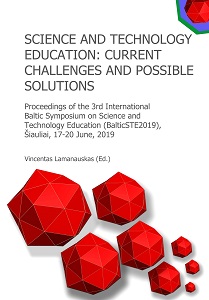
ONE CHEMISTRY - TWO MEANINGS. SCIENCE AND EDUCATION: COMPARATIVE ANALYSIS OF THE ROLES, PRESENTATION AND APPLICATIONS
The comparative analysis of different meanings of Chemistry is carried out, taking in account philosophical, didactic, psychological and socio-cultural aspects. The issue is discussed in terms of the concurrent existence of two different subsystems referred both to Science and Education which can be found in presentations of chemistry knowledge. The study overviews researcher’s findings made in the field of Science Philosophy and Chemistry Didactics. Theoretical study based on profound concepts from Science and Chemistry philosophy as well on few empiric researches carried out by researcher in the field of Chemistry Didactics.
More...